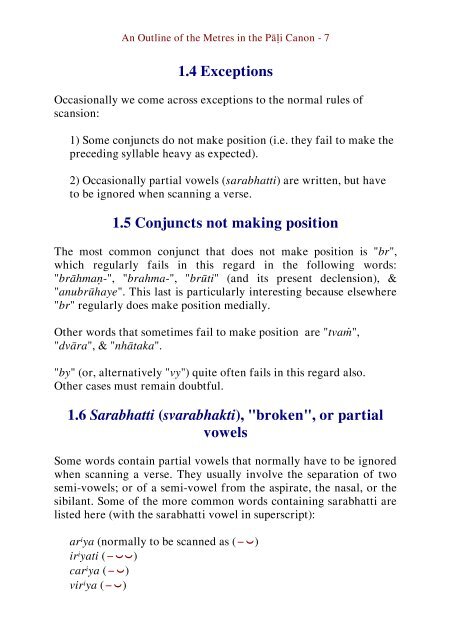An Outline of the Metres in the Pāḷi Canon
A concise but thorough explanation of the metres that are found in the Pāli canon, along with examples and glossary.
A concise but thorough explanation of the metres that are found in the Pāli canon, along with examples and glossary.
Create successful ePaper yourself
Turn your PDF publications into a flip-book with our unique Google optimized e-Paper software.
<strong>An</strong> <strong>Outl<strong>in</strong>e</strong> <strong>of</strong> <strong>the</strong> <strong>Metres</strong> <strong>in</strong> <strong>the</strong> <strong>Pāḷi</strong> <strong>Canon</strong> - 7<br />
1.4 Exceptions<br />
Occasionally we come across exceptions to <strong>the</strong> normal rules <strong>of</strong><br />
scansion:<br />
1) Some conjuncts do not make position (i.e. <strong>the</strong>y fail to make <strong>the</strong><br />
preced<strong>in</strong>g syllable heavy as expected).<br />
2) Occasionally partial vowels (sarabhatti) are written, but have<br />
to be ignored when scann<strong>in</strong>g a verse.<br />
1.5 Conjuncts not mak<strong>in</strong>g position<br />
The most common conjunct that does not make position is "br",<br />
which regularly fails <strong>in</strong> this regard <strong>in</strong> <strong>the</strong> follow<strong>in</strong>g words:<br />
"brāhmaṇ-", "brahma-", "brūti" (and its present declension), &<br />
"anubrūhaye". This last is particularly <strong>in</strong>terest<strong>in</strong>g because elsewhere<br />
"br" regularly does make position medially.<br />
O<strong>the</strong>r words that sometimes fail to make position are "tvaṁ",<br />
"dvāra", & "nhātaka".<br />
"by" (or, alternatively "vy") quite <strong>of</strong>ten fails <strong>in</strong> this regard also.<br />
O<strong>the</strong>r cases must rema<strong>in</strong> doubtful.<br />
1.6 Sarabhatti (svarabhakti), "broken", or partial<br />
vowels<br />
Some words conta<strong>in</strong> partial vowels that normally have to be ignored<br />
when scann<strong>in</strong>g a verse. They usually <strong>in</strong>volve <strong>the</strong> separation <strong>of</strong> two<br />
semi-vowels; or <strong>of</strong> a semi-vowel from <strong>the</strong> aspirate, <strong>the</strong> nasal, or <strong>the</strong><br />
sibilant. Some <strong>of</strong> <strong>the</strong> more common words conta<strong>in</strong><strong>in</strong>g sarabhatti are<br />
listed here (with <strong>the</strong> sarabhatti vowel <strong>in</strong> superscript):<br />
ar i ya (normally to be scanned as (−⏑)<br />
ir i yati (−⏑⏑)<br />
car i ya (−⏑)<br />
vir i ya (−⏑)

















